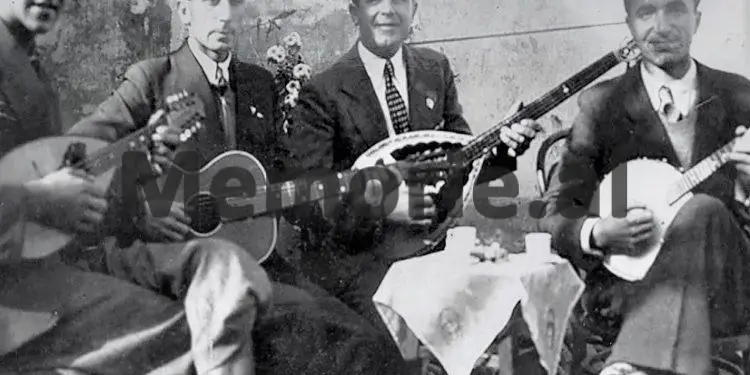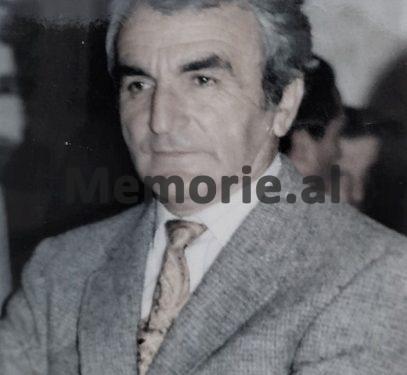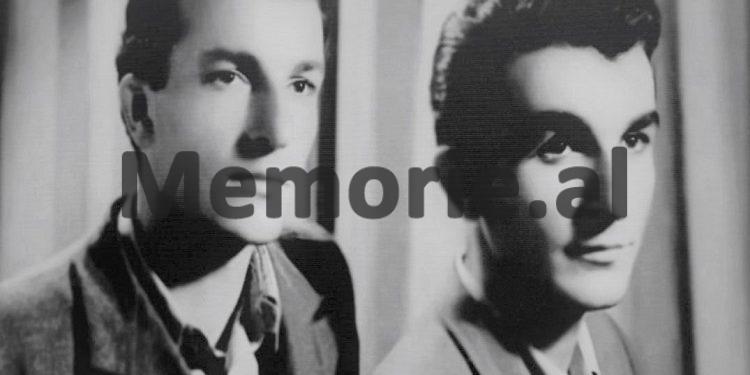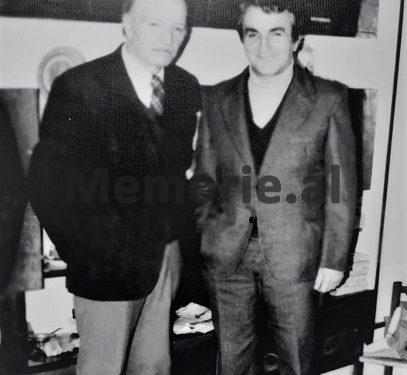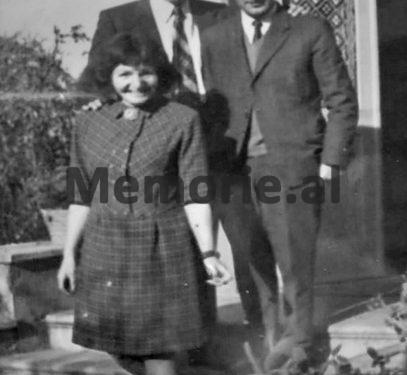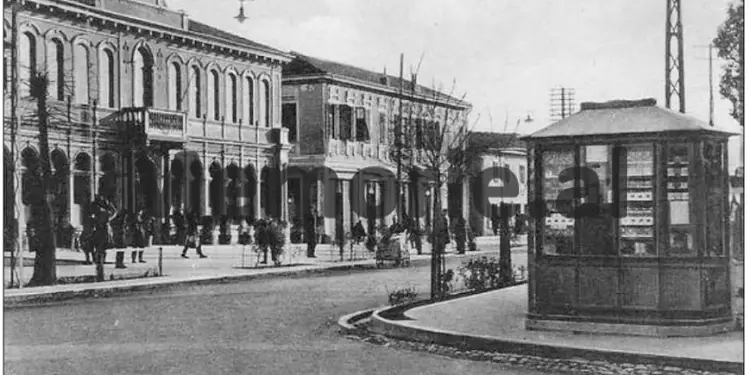Dashnor Kaloçi
– The long ordeal of a family and the endless drama of the Kujxhija brothers, under the terror of Enver Hoxha’s communist regime –
Memorie.al / If we had to list the Shkodra families that were persecuted by the communist regime of Enver Hoxha in the period 1944 – 1990, we would undoubtedly list the well-known Kujxhija family among them. If we are going to talk about suffering, long and exhausting, we cannot fail to mention this family, one of the most popular in the city of Shkodra, which experienced for a very long time its painful ordeal, which fell on it and on many other Shkodra families. The documents say that the Kujxhija came and settled in this city in the distant 1770s. This can be seen in the preserved records of baptisms that the Catholic Church of Shkodra has. As the city at that time was growing and increasing in number, handicrafts also flourished. In their case, in crafts. Thus, generation after generation, these master craftsmen, with their work and skill, get the surname Kujxhija. This makes you think that they worked as artisans of Arthurian and jewelry. They took up residence in one of the new areas of that time; in ‘Gjuhadol’, where there was a chain of Catholic churches and assemblies nearby.
One of the most vocal men of this great house, since the beginning of the 20th century, is mentioned Kolë Kujxhija, a man with a great reputation in the city, who was elected the chief elder of the area that, starting from Gjuhadoli and going to Arra e Madhe. Kola turns out to be a man with an extended social circle, which was seen from the friendships he had, mainly with the Catholic Clergy and with the great Franciscans, such as Father Gjergj Fishta, Anton Harapi, Vinçnes Prenushi, etc. The house of the Kujxhija family is about 50 meters away from the Franciscan Assembly. Kola did not inherit the craft of the ancestors as a tailor, but he was engaged in trade, with the Italians, in the new reality of a city that underwent strong transformations in modernity after the First World War. However, he did not enjoy the fruits of his labor much, as he died unexpectedly, at the age of 52, in 1938.
The Kujxhija family did not get involved in politics, neither with King Zog i Parë, nor with Noli, nor with the Italians, Germans or communists, like many other families. But the sufferings of this family began after 1944, immediately after Enver Hoxha’s communists came to power. During the long and difficult years of that communist regime, her three sons: Zefi, Viktori and Injaci, suffered a total of 34 years in political prison.
They experienced severe physical and psychological torture, but they would survive with honor and dignity, standing manfully, not to betray the values of their family and the ideals they believed in, and also their comrades and friends, inside and outside prisons and preserving their personal and family good name.
Zefi, the eldest, was born in 1911 and after completing trade school, he started working with his father in the shop, selling building materials. Zefi became the master of the house at the age of 25, after Kola’s death, where he continued to work in the shop left by his father.
After the establishment of the communist dictatorship, in 1944, the first problems began for Zefi. The State Security arrested him in 1946, on the charge of “participating in the Postriba Movement”. At that time he was only 36 years old and was sentenced to five years in prison. The entire investigative and judicial process was fabricated with depositions and false testimony, under the terrible pressure of the communist state’s terror for that event.
Zefi confides to one of his friends (there from the last years of his life) that, while he was arrested and kept in the house of Pjetër Çurçië, one night they took him on foot to the cemetery of Rrëmaj, together with others. They put them in front of the shooting wall and ask them to admit their guilt that they would forgive them, otherwise, they would shoot them there. He, along with others, said that; they have nothing to say, as the accusations against them were not true.
Then, in the wee hours after midnight, the firing squad fired rifles into the air to scare them away. The horror of death falls upon them, and that macabre game of psychological terror, they would not forget throughout their lives. He suffered three and a half years of imprisonment, in the prison of Shkodra, where he faced oppressive physical and psychological violence from the State Security and the Investigation. This was a heavy blow for him and for the whole family, because in addition to being considered a family against the regime, Zefi’s imprisonment created serious economic problems in their family, since the work force that supported him did not work.
After his release from prison, in 1950, his shop was closed, so he was forced to work in a state enterprise, where he cut glass, because he was not allowed to do other work. This would remain his craft, from those days and throughout his life. Zefi never married and devoted himself to his family, as the eldest brother, replacing the role of father to his siblings, until he closed his eyes forever in 1985.
Ndoci, the second son of the Kujxhija family, after completing the first grades in the primary schools run by the Catholic Clergy, went to further study at the “Normal” in Elbasan, where he graduated with the highest honors. After that he became a very good and famous teacher in the whole area of Shkodra. He was endowed with a wide intellectual and pedagogical culture and dedicated his whole life to learning and educating the youth in the Shkodra district.
He was also a good connoisseur of music and a very good instrumentalist. Ndoci, although he was not imprisoned or exiled, faced throughout his life with avoidance, isolation, rejection and the consequences of being the brother of political convicts, as opponents of the regime in power. Ndoci passed away in 1981 and with the advent of democracy, he was praised by the President of the Republic, with the title: “Teacher of the People”, for the contribution he made in the field of education.
Çeçilja, the first daughter of the Kujxhija family, attended the School of Salesian Nuns in the city of Shkodra, which was a school for girls, very advanced for the time, where she stood out for her intelligence in lessons and behavior. She married Dr. Pjetër Prelë, a prominent doctor, who had completed his secondary studies in Istanbul and then graduated from the University of Medicine in Paris. Dr. Pjetër Prela was the first to bring and install in Albania, (from Paris), the X-ray machine, for visits, mainly of the lungs.
He served poor patients who did not have money to visit and he performed these checks, in most cases for free. This device served the people of Shkodra and its surroundings, while during the communist regime; it was installed in the Sanatorium of Shkodra. Since Çeçilja and Dr. Pjeter Prela, they had no children; they sacrificed their lives and wealth to keep their brothers, Viktor and Injac, in prison. Çeçilja lived a long time and passed away in Shkodër in 2006.
Gjoni, was one of the sons of the family, who finished primary school at the Franciscan Assembly, where he stood out from an early age for his inclination and talent for music. He was one of the most talented students of Father Martin Gjoka, who, with his genius, created generations of musicians, musicologists and composers, such as: Prenk Jakova, Cesk Zadeja, Tonin Harapi, etc.
After his studies in Shkodër, Gjoni secured a scholarship to the “Luigi Cherubini” Conservatory of Music in Florence. During his studies, he also started to deal with the collection of musical folklore of Albania. He wrote two musical works, which are considered the first works in the field of Albanian ethno-musicology: “National Dance” and “Haengu Shkodran”, one of which he published in Florence, in 1942, while the other, saw the light of publication only in 2019, in Tirana.
Unfortunately, his life was cut short very early, in 1943, at the age of 23, by a bombing of the city of Florence, by the aviation of the Anglo-American allied army. At that time, the population of Florence was convinced that the Allies would not drop bombs on the capital of Italian culture and one of the most artistic and architectural cities in the world.
It is said that there were many who did not take seriously the threat of bombing from the air, among them Gjoni, who at this time was studying his pianoforte and did not listen to the sirens. This was a great loss for the family, relatives, and also for Albanian ethno-musicology. Without a doubt, Albanian art also lost a very promising seed.
Gjyljana, was born in 1923 and after completing Pedagogical high school and, like her brother Ndoci, was appointed a teacher far from the city of Shkodra. However, according to the customs and mentality of the time, it was difficult for the family to accept a young girl working away from home. She married a little later Pjerin Bushati, who was a very cultured man.
Pjerini, in his youth, had been the personal secretary of the poet and researcher Dom Ndre Mjeda, and then he studied in Florence, for Literature and Pedagogy, and then also for Pharmaceuticals. He was a teacher and a colleague for generations of pharmacists in the city of Shkodra. Pjerini passed away in 1991, while Gjyljana, in 2008, both in the city of Shkodra.
Viktori was born in 1930 and did his primary and secondary schooling at the Franciscan school, in the “Gjuhadol” neighborhood. After the closure of this school, he was transferred to the state gymnasium. He was a tall, graceful and elegant boy, educated, but also very courageous, which would cost him dearly throughout his life, due to the fierce persecution by the communist regime. Being a born anti-communist, he began, from his youth, to show a self-taught interest in matters of domestic and world politics.
As a result, Viktori was expelled from high school in 1946, because together with some of his friends, he organized anti-communist youth groups, which distributed tracts with anti-communist content throughout the city of Shkodra. They also organized the funeral ceremony of the Archbishop of Shkodra, Monsignor Gaspër Thaçi, in May of that year, in open opposition to the order of the Section of People’s Protection and State Security.
Victor was arrested by the State Security together with a group of friends, including: Injac Serreqi, Gjon Kovaçi, Česk Hilgega, Ana Daja, Elez Nurja, Liza Pali, Albert Çoba, etc. During the investigative process, they are accused of participating in an anti-communist youth organization, which carried out activities in the recruitment of youth and the distribution of tracts against the communist government, in cooperation with the clergy: Father Donat Kurti, Dom Mark Hasi and Dom Anton Muzaj.
He was subjected to a serious investigation by the investigator of this file P.K., with prosecutor Hys Zaja, not taking into account his young age of 17 years. After that, Victor was given a sentence of ten years in prison (despite the serious efforts of the defense lawyer, Dr. Qemal Shehi), by a jury headed by Misto Bllaci. He suffered only three and a half years, because he benefited from early release, from the amnesty that was granted at that time by the communist regime, due to his young age.
After getting out of prison, Viktori restarted his life, working as a manual laborer, wherever he could get a job, such as at SMT, (Machine and Tractor Station), an agricultural enterprise in the village of Kukël, which was far from the city of Shkodra, where he was forced to go and return every day, with hours of travel. Victor was a man with a wide circle of friends, who enjoyed respect among his friends, as he was characterized by a very strong character and everyone knew him as a very honest man. Since he was not allowed to continue school, he was self-taught.
He started to study different literature and foreign languages, such as: Italian, French and English. Life had deprived him of the most minimal elements for a young man, very capable intellectually and spiritually, due to the stain on his biography, as a former political prisoner who was constantly monitored by agents and collaborators of the State Security. In these difficult conditions, he decided to escape outside of Albania, together with his younger brother, Injac, after they received information that in that period, the communist regime did not deport the families of the fugitives.
Initially, there were four friends who made the plans and showed the desire to escape together, where, in addition to Viktor and Injac, there was also Tom Prel Zefi and Niko Kirka, (from Korça), who wanted to join his father, Kristo Kirka, who was among the founders of the Albanian diaspora in the USA. Tom Zefi asked for help from a villager from Lezha, to cross the border, but this did not happen, because that person was viewed with suspicion by the four friends and they were forced to cut off all contact with him.
(From archival documents discovered after the fall of the communist regime, the villager turned out to be a collaborator of the State Security and with the nickname “Heroic Brigade”). Under these conditions, when their plan failed and with the arrest of one of their friends, Viktori and Injac, they changed their plan and, fearing that they would also be arrested soon, they decided to flee from Velipoja. Thus, in April 1957, Victor together with Injac left Shkodra in the direction of Velipoja, where they did most of the way on foot.
After arriving near the mouth of the Buna River, they boarded a boat (as agreed with a local villager) who took the Yugoslavs ashore, asking them to stay in the water until he returned. by boat in Albanian land, to avoid being caught by the border guards. After seeing that the boat and the person who took them out returned to the Albanian land, the two got out and walked deep into the Yugoslav land and, not knowing the terrain, fell into the hands of the Yugoslav border guards.
The Yugoslav border authorities and those of the UDB, after interrogating them for a whole day, after initially suspecting them to be agents sent by the Albanian State Security – tried to recruit them as Yugoslav agents, in exchange for allowing them to staying in Yugoslavia, which was not accepted in any way by the two brothers, with the claim that they were not involved in politics, but were fleeing for economic and health reasons, since Injaci had a damaged shoulder and could not be treated in Albania. They declared that they want to go live with their brother in the USA, but unfortunately, after keeping them for nearly 15 hours, the relevant Yugoslav bodies of the Ministry of Internal Affairs, returned them and handed them over to the Albanian border guards.
Here began the ordeal of severe suffering, with terrible torture, for both of them. At the end of the investigation, Victor was sentenced to 20 years in prison and Injaci to 15, by the decision of the Military Court, with prosecutor Mina Niço and with a jury chaired by Llazi Polena with his assistants, Belul Shabani and Pilo Rapaj. The representative of the defense was the well-known lawyer, Pjerin Koliqi, who revealed all his legal skills for the defense of Viktor and Ignaci, but without any results, since the lawyer’s profession, at that time, was quite formal.
It was the Investigation that depended on the State Security that had the main role in concocting false accusations and “proving” them, by means of the most inhumane physical and psychological tortures. After appealing the decision, the Supreme Military Court, presided over by the notorious Arani Çela, Loni Dimoshi and Sotir Spiro, prosecutor Faik Minarolli, upheld the decision of the Shkodra Court. Thus Viktori suffered 17.5 years of political imprisonment, first in Shkodra prison and the rest in the notorious Burrel prison.
During the years of long imprisonment, in a part of which the two brothers lived together, (which somewhat eased their suffering), Viktori had serious health problems, up to partial inability to move, but the help of his brother and friends, like and young age, made him refit and recover.
Although very reserved not to tell the stories of the sufferings in the family, (so as not to hurt the family members with the terrible events he had experienced and the tragic ones of his friends he had seen and experienced), in conversations with his friends and close friends, he it showed many events, where he was subjected to the most inhuman tortures, especially during the investigation, which was carried out by the investigators of the State Security, Xhafer Rraboshta, Xhevdet Miloti, Ali Dhunga and Major Asim Aliko, under the direction of the main functionary of the Security in the district of Shkodra , Nasi Nako.
Father Zef Pllumi, in his book “Rrno only for me tregua”, brings an episode, where he says: “Ah, Viktor Kujxhija, I will never forget the screams that came out of your boyish body, the same way we tortured them, they hang in Beden’s fork, but Christ is tied to the cross”! During the years of long imprisonment, he devoted himself to literature and the in-depth learning of foreign languages, especially French, from where he translated the work “History of England” by the well-known French writer and historian, Andre Maurois.
During the prison period, he created close friendships with many fellow prisoners from different provinces of Albania, where we can mention some of them, such as: Shyqyri Gruda, Dom Nikollë Mazreku, Ejëll Çoba, Pjetër Arbnori, Gjon Lala, Father Konrad Gjolaj, Gjon Parubi, (from Shkodra), Gjin Pjeter Doçi from Mirdita, Abdulla Sallaku from Tirana, Dr. Ylli Xhagjika from Korça, Prelë Syku from Bragu i Mata, Lezha district, etc. Victor was released from prison in November 1974. This was a great joy for him and his entire family and social circle.
In 1976, Viktori married Irena Dukagjini, released from exile by Savra e Lushnja, three years before, and they had two children: a son and a daughter. After his release, Victor started working as a metal worker (a very physically demanding job), but it was the only thing he was allowed to do. Heavy work, in difficult conditions and with long hours, took its toll, causing serious health problems.
Victor died in 1988, leaving his wife and two small children and a great void in the family and all relatives. He was taken to his final residence in a funeral with an extraordinary attendance, due to the respect and sensitivity that his life had created, but also his untimely death.
Injaci, the last child of the family, was born in 1932. Since childhood, he began to show dexterity and intelligence, which characterized his whole life. His father left him an orphan at the age of 5-6 and he was raised by his mother and older brothers. During his adolescence and youth, he was very passionate about music and based on this fact, he finished school at the Franciscan College in the city of Shkodra, in 1948; he went to the Artistic High School, “Jordan Misja” in Tirana.
He could only stay there for 10 months (where he studied piano and cello), as soon as his family biography was learned (that he had two brothers in political prisons), he was expelled from all schools, interrupting his path of knowledge and of his musical training and quite promising. This forced him to return to Shkodër, where he had to do heavy work, at the (Brick Factory), while also continuing his lessons at night school, without breaking from work.
In the years 1950-1952, Injaci performed the mandatory military service and was sent to the wards of Xenjo or, as they were otherwise known under their breath, as: forced labor camps, (since there was little to distinguish them from camps and prisons), where at that time he until the collapse of the communist regime in 1990, contingents of soldiers with a “bad biography” were sent there and their only “weapon” were pickaxes and shovels. The work was so heavy that, in order to get a few days of medical reports and rest, Injaci, as well as others, were forced to do unimaginable acts, such as breaking the fingers of the hand or dislocating the shoulder.
There, he joined some of his friends, who came from “reactionary families”, such as: Tonin Kovaçi, Albert Çoba, Viktor Dosti, Xhahid Xhaferi, etc., all sons of politically affected families. After finishing the army, Injaci returned to Shkodër, where he was faced with a difficult economic-family situation and with increasing pressure from the surveillance and espionage of people introduced by the State Security.
In these conditions, the only possibility to escape from that real hell that was narrowing the noose day by day was to escape abroad, towards the free world. But as we pointed out a little above, the escape and return from the Yugoslav authorities cost Injac about 100 days of very serious investigation, by the same investigators of the State Security, (known for the violence they used against the arrested), who jointly investigated Injac and Victor.
Ultimately, Injaci was sentenced to 15 years of political imprisonment, of which he served 8 years and 6 months in the notorious Burrel prison. He was released in 1965, as a result of an amnesty granted at the time by the communist regime, for the remaining years of his sentence. During the prison period, Njaci learned several foreign languages, such as: English, Italian, French and a little German. Compiled two dictionaries: English-Albanian, French-Albanian, (in manuscript), using some small papers that he collected during visits over the years, brought to him by relatives, and others that he collected from his roommates.
He also wrote some poems and made some translations from Italian and German, which are kept in manuscript by the family. After leaving prison, forced by the very difficult economic situation of the family, Injaci started doing different jobs. He was a man who had golden hands and was capable of any job. It is worth mentioning, a work done by him, which was a doll made of plaster or plaster, which was accepted as an ornament in the Executive Committee of the Shkodra district of that time, but when it was found out that it was made by Injac Kujxhija , was immediately removed from the place where it was exhibited.
After many attempts, he got a job at the Manufacturing Industrial Enterprise and later at the Wood Processing Plant, where he worked until he retired. In 1978, Injaci married Marije Toska and had a daughter. During the years of democracy, he began an active social life, when he participated in many activities related to the commemoration of the crimes of communism. In the same way, Injaci was an active person since the establishment of the National Association of Former Political Prisoners and Persecuted of Albania for the Shkodra branch. He died in 2013, at the age of 81./Memorie.al




